Cloud computing has been rising in popularity over the past few years. It doesn’t seem to be slowing down anytime soon. Now that so many businesses are using cloud-based tools to store their data, it seems only natural that it will start to make its way into other industries.
One industry that’s particularly ripe for disruption?
Yes, it is the Healthcare industry.
Cloud computing holds the key to transforming the healthcare industry from one that only delivers clinical care to patients into one that also captures. It analyzes data about what works, what doesn’t, and why, using analytics, so it can improve outcomes and lower costs.
Moreover, healthcare cloud computing presents numerous benefits, and organizations that don’t hop on the cloud computing bandwagon may soon find themselves behind the curve.
Cloud application development will play an even more vital role in healthcare in the future. Here, we will discuss how it will shape the future of the healthcare industry in 2023.
Cloud Computing In Healthcare: A Brief
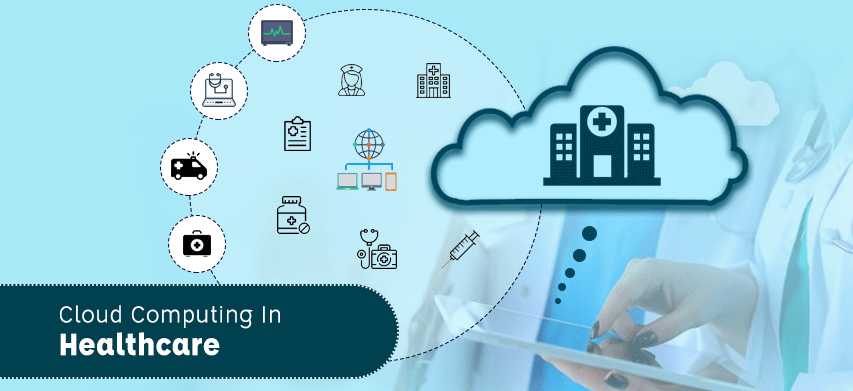
Cloud computing is poised to have a significant impact on the healthcare industry. Hospitals and other healthcare organizations are increasingly turning to cloud-based solutions to improve patient care, streamline operations, and reduce costs.
Perhaps most importantly, cloud-based solutions can help healthcare organizations improve patient care by providing easy access to data and applications.
For example, cloud-based Electronic Health Records (EHRs) can give doctors and nurses instant access to patient records. This can help improve the quality of care by allowing clinicians to make more informed decisions.
In addition, cloud-based solutions can help healthcare organizations streamline their operations. For instance, cloud-based solutions can automate administrative tasks such as billing and scheduling. This can free up staff to focus on more critical tasks, such as patient care.
Must Read: Healthcare’s Most Intelligent Software: Simplify Process With Different Healthcare App Solutions
Healthcare organizations can save money on hardware, software, and maintenance costs by consolidating data and applications in the cloud. In addition, cloud-based solutions can help healthcare organizations save money on energy costs by reducing the need for on-site data centers.
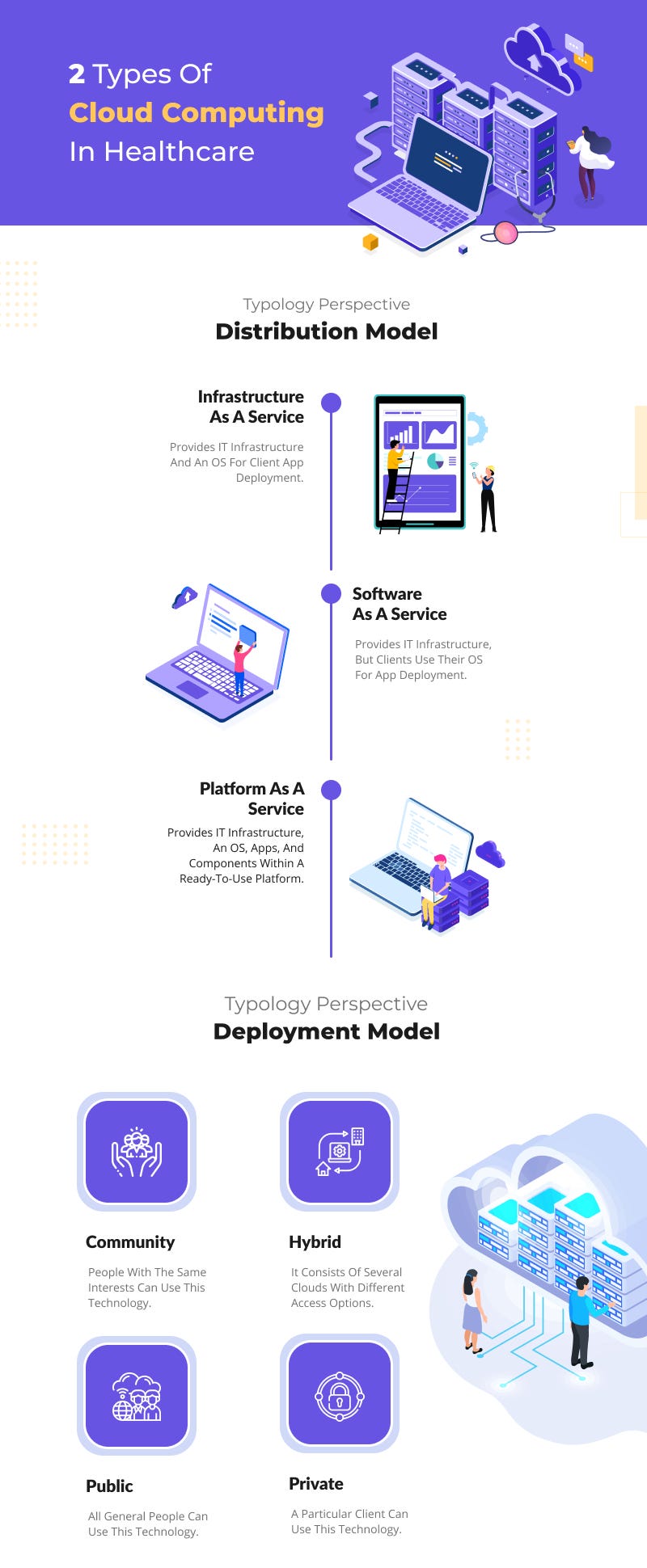
Need for Cloud Computing in Healthcare
Currently, hospital IT systems are set up to support a more traditional model, where data and programs run on computers that are physically located in each institution. As a result, there’s no centralized system for sharing information between different hospitals or other parts of an individual’s care team.
Cloud computing helps tackle some significant challenges facing providers today: It enables users to access critical medical records and other data from multiple locations (i.e., your home computer or smartphone) instead of having to visit your provider’s office.
One of the most popular uses for cloud computing in healthcare is EMR systems. These cloud-based EMRs can be accessed from any location with an internet connection, making them much more convenient than traditional paper records.
Cloud computing also makes it easier for health professionals at different organizations to communicate electronically about patients. With the increased use of electronic medical records, cloud computing can improve everything from patient safety to overall financial efficiency in healthcare delivery.
Another everyday use for cloud computing in healthcare is for HIE platforms. HIEs exchange health information between different organizations, such as hospitals, clinics, and insurance companies.
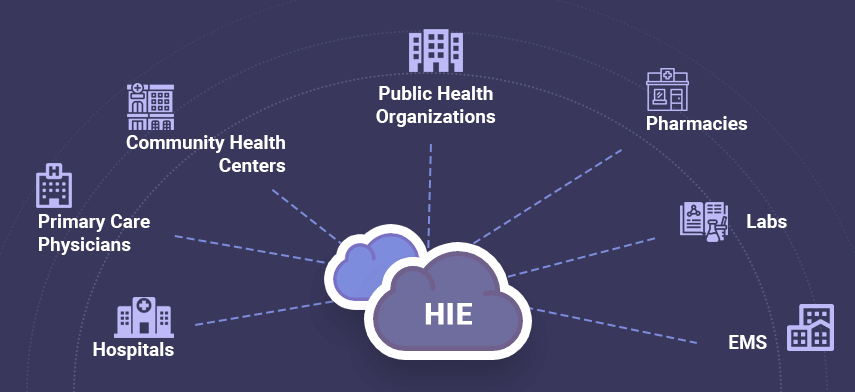
HIEs can be cloud-based or maintained on a local server. Cloud-based HIE systems offer the benefits of flexibility, cost savings, and easy accessibility from any location.
Finally, cloud computing is also being used in telemedicine applications, which allow patients to access healthcare services remotely via online communication. This can be especially useful for patients who live in remote areas and have limited access to healthcare providers or for those with chronic conditions that require ongoing care.
What Does Cloud Computing Have to Offer the Health Sector?
Cloud computing has several advantages to offer over on-premises deployments. It allows organizations to gain access to more powerful hardware without shelling out for their hardware and facilities.
Using virtual servers hosted off-site in a data center, businesses can pack much more processing power into less space and lower costs.
If you’re using services like Salesforce CRM or Microsoft Office 365 from a cloud provider like Microsoft Azure or Amazon Web Services, you’re already getting an idea of what being hosted on-site looks like; namely — it’s cheaper and faster than building your server room.
Must Read: A Complete Guide For Healthcare App Development
Top 10 Benefits You Can’t Ignore for Cloud Computing in Healthcare
A cloud-based system could be the most crucial step you take toward improving efficiency and cutting costs in your healthcare practice, but it can be challenging to decide whether or not it’s right for you.
As more and more medical professionals use cloud computing to manage clinical data, patient records, communication between doctors, and more, the industry has reaped significant benefits in improved care and cost savings.
1) Lowers Costs
Cloud computing not only reduces costs by allowing you to rent processing power and storage instead of buying and maintaining it on your own but also by increasing flexibility — your workload can expand or contract as needed. With cloud computing, you can also avoid some of the expensive maintenance fees of hospitals associated with legacy hardware.
An old report released by IBM Research claims that cloud computing could save hospitals more than $600 billion over five years — that’s enormous savings across an industry plagued by ever-rising costs. That’s good news for patients; if hospitals are forced to make up for their losses elsewhere, you can bet that price is passed down to consumers.
2) Improved Performance
Using cloud computing in healthcare, you can access your data and applications anywhere. Whether you’re at home or on vacation, you can be productive and work with your team remotely as long as you have an Internet connection.
So if it takes two hours for a server to reboot at your office, having that access from a remote location could save several staff members from wasting valuable time.
Plus, with improved performance come cost savings because cloud technology allows healthcare providers to pay for what they use when they need it rather than having to plan ahead or pay for unused resources.
3) Enhances Security
Cloud computing is one of today’s most important security tools. Your private data is hosted on a server, not on your computer. This makes it harder for unauthorized users to access your data and steal your identity.
It also gives you control over what type of encryption is used and how strong it is (that’s an essential factor when you consider that 56 percent of Americans haven’t updated their antivirus software in over a year).
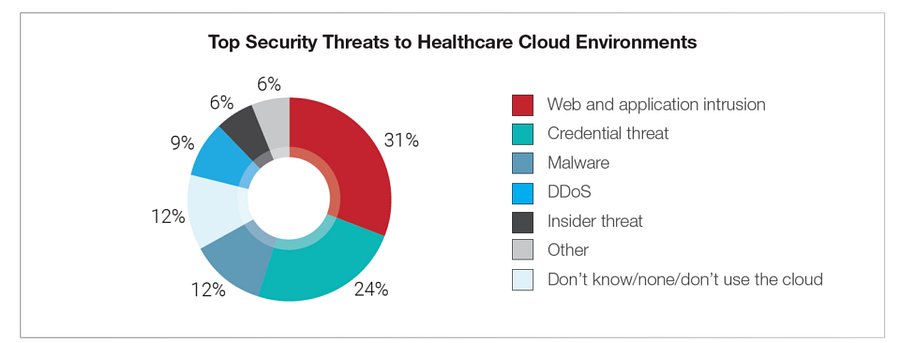
Additionally, cloud computing in healthcare offers more frequent backups than other systems do — it can be automated, so you don’t have to worry about forgetting to back up your data or waiting until there’s time.
And if something does happen to go wrong with your system, everything can be restored from backup within minutes or hours rather than days or weeks.
4) Improves Patient Experience
One of today’s top priorities in healthcare is improving patient experience. According to a recent report from Truven Health Analytics, patients who encounter errors and delays when receiving treatment tend to be less satisfied with their care and are more likely to delay future visits or forego additional therapies altogether.
Cloud computing in the healthcare industry helps eliminate some of these concerns by providing reliable access to data, apps, and devices from anywhere at any time. This flexibility can significantly enhance patient satisfaction.
In fact, according to findings from KPMG, organizations that have implemented cloud technology have seen an increase in consumer ratings of between 15% and 25%. That translates into millions of dollars saved through the increased patient retention rates.
5) Better Access to Health Data
In an era of increased patient mobility, it’s easy to imagine a scenario where health data is scattered across devices, desktops, and laptops. That could be a huge problem if there’s an emergency at home and you need to share information with your doctor.
Cloud computing services like Microsoft Azure can help solve that issue by storing your healthcare data remotely and securely, accessible from any computer or mobile device. Plus, if multiple users have access to that information — say, your healthcare provider as well as family members — it’s easier to keep everyone on the same page.
6) Protects From Disasters
Cloud computing protects healthcare organizations from disasters since their data isn’t stored locally but is instead mirrored and backed up regularly across multiple datacenters.
Additionally, should a disaster strike, most providers have failover protocols that move operations back to the leading data center while they assess damages. In addition to making enterprises more resilient overall, cloud computing allows them to focus on growth rather than their own technology.
With cloud-based systems, businesses are able to spend less time worrying about backups and maintenance — and more time expanding their reach.
7) Increases Flexibility and Freedom
Cloud computing offers healthcare organizations a way to provide patients and doctors with access to a variety of services without having to hire specialists and invest in special equipment.
With cloud computing, hospitals have more freedom over what they can offer and how they do it. They can respond quickly to changes in technology, manage their budgets better, and focus on patient care rather than paperwork.
The move to electronic medical records has been a significant step forward for healthcare, but when implemented poorly, it can also be an enormous burden for both providers and patients alike.
That’s why cloud computing in healthcare is such an attractive option — it provides many of the benefits of electronic medical records while removing many of their most significant drawbacks.
8) Helps Manage Financial Resources
Managing healthcare can be expensive, especially when multiple care providers are involved. Cloud-based solutions make it easier to share critical financial data across providers, which allows them to keep better track of expenses, maximize reimbursement, and coordinate care.
This also helps patients ensure that they are being treated under a unified financial model, giving them more control over how their money is being spent on medical care. In short, cloud computing for healthcare gives everyone involved a better sense of where finances stand at any given time.
9) Faster Decision-Making
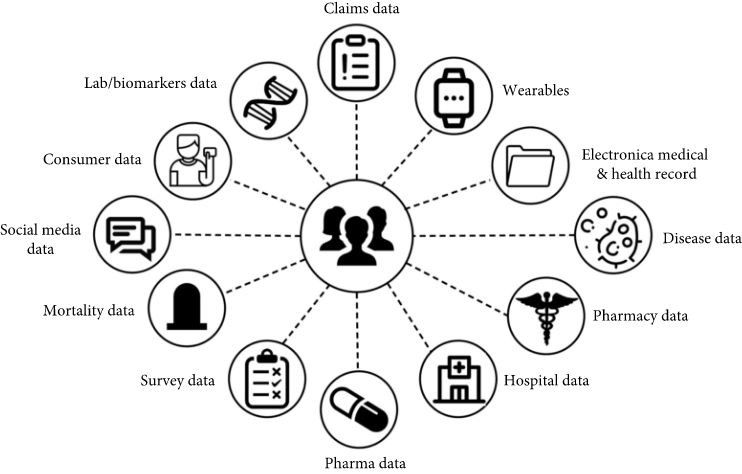
Cloud computing has a number of benefits for healthcare organizations, including reduced network latency and better decision-making. In a traditional environment, you’d need to purchase and implement software that use only with one particular piece of equipment.
But using cloud computing for healthcare enables you to try out that system virtually by downloading it from a server, rather than purchasing hardware and installing it locally.
If that solution doesn’t work for your organization, download another program; there are literally thousands available — and cloud computing makes trying them all possible without having to invest in any hardware whatsoever.
10) Eliminates Wastefulness
Cloud technology can help your healthcare organization become more efficient. If a doctor makes a change to an electronic medical record, that change is made instantly and efficiently, rather than having to be sent over a network or saved and printed out; doctors also have instant access to any test results and images. This means patients don’t have to wait for new information before it’s available to their caregivers.
Additionally, cloud services enable more effective interdepartmental communication by allowing all personnel with necessary security access to share secure documents. More companies are using cloud technology with telemedicine applications, which facilitate real-time two-way video communication between patients and specialists.
Significant Upcoming Changes in Healthcare
With more and more doctors turning to electronic records and patients demanding faster, easier access to their medical records, there’s no doubt that healthcare is on a promising trajectory.
But what are some significant upcoming changes in healthcare?
Let’s take a look at how cloud computing in healthcare may help fuel innovation in this industry that’s been lagging behind for years. The following factors can significantly change healthcare in our lifetime.
Microsoft’s Azure Healthcare: Microsoft’s Azure Cloud application development has already made its way into other industries such as banking, retail, and transportation; now, it’s poised to transform healthcare.
Microsoft’s Cloud-based Health Vault Service: It will allow users to store their medical records online securely and privately. In addition, it will provide secure file sharing between providers, which could potentially improve communication between specialists — resulting in better care for patients.
It also gives doctors immediate access to patient information from any location or device with an internet connection (even if they don’t have a copy of your chart). This means they can refer you to specialists without delay while maintaining your privacy.
Also Read: Healthcare App Ideas: 20+ Ideas For Healthcare Professionals
Significant Cloud Applications Within Healthcare Industry
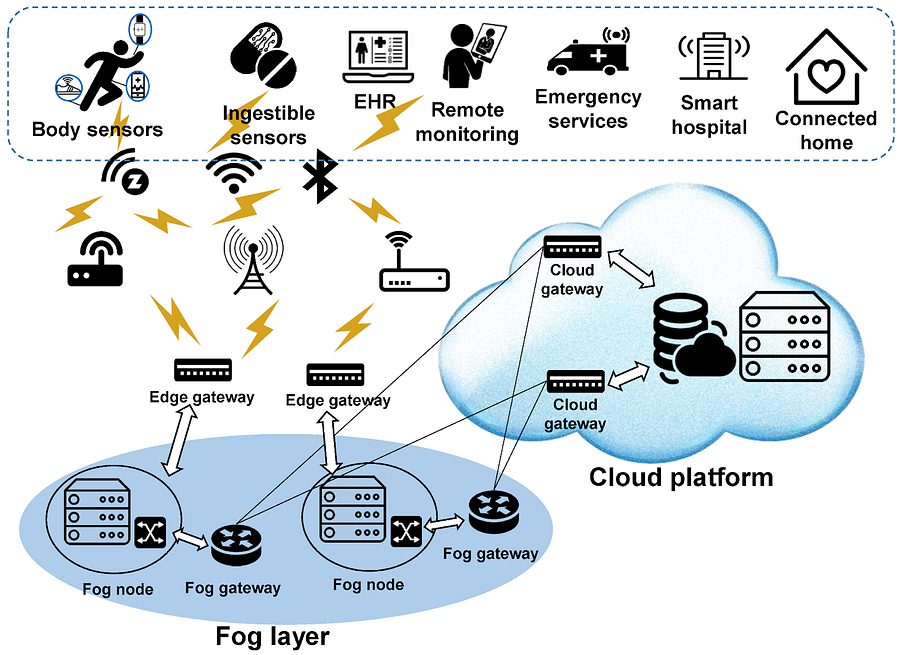
Cloud technology has been changing industries for years, and now it’s changing medicine. Doctors are no longer tethered to their offices and hospitals but are free to travel from place to place. And there’s no need for an IT technician to install new hardware or software — it’s all done from a central location via a secure virtual connection.
Today, nearly all medical devices have some sort of online connectivity and can do monitoring remotely; both patients and doctors can access medical records; diagnostic imaging services like MRI scans can provide access to specialists who may be hundreds or thousands of miles away.
Plus, researchers in multiple locations can collaborate on clinical trials, making them faster and less expensive — which means lower costs for patients!
Also Read: AWS vs Azure vs Google Cloud: Which Platform Is Best?
What Kind of Security Should You Look for in a Cloud-Based System?
One of the most important things to remember when choosing a cloud-based system is to look for features. These features include encryption and checking to see if your provider offers safeguards against internal and external threats.
Encryption ensures that if someone were to hack into your account, they would not be able to view any of your data. There are two types of encryption: transport layer security (TLS) and secure sockets layer (SSL).
TLS secures communication between two endpoints, while SSL adds an extra layer by encrypting data as it travels over computer networks and servers. You should also make sure that you have both physical and technical safeguards in place in case one method fails.
Also Read: Top Cloud Computing Trends That Will Shape Businesses In The Coming Years
Privacy Concerns When It Comes To Storing Information On An External Server
Although your data is secure from all prying eyes on a private server, it could still be vulnerable if something goes wrong with your computer or if a hacker gains access to it. With online servers and other storage solutions like Dropbox, you are trading some level of security for convenience and accessibility.
There’s also an issue related to privacy when you upload your information to an external server: By sharing that information, you give others access to it as well. You could be giving away more than you want or intend.
This is why many people prefer services such as Google Docs, in which their data is on a server under their control; they know that only they can access it and share their data with whomever they choose.
Conclusion
Healthcare has gone digital, and it’s transforming how it operates internally and interacts with patients. Seeing the usage of healthcare software solutions, we can say that cloud computing in healthcare is inevitable. It’s happening all around us. And, it’s only a matter of time until the health sector fully adopts cloud technology into its practices.
It’s clear that the benefits for both providers and patients are vast and varied. Thus, making this technology a vital piece of the puzzle as we move into an increasingly digital future.
If you’re looking to make the switch to cloud-based systems or are just curious about what they can offer, be sure to check out our top 10 list or contact our cloud app development experts at ValueCoders, which is a leading healthcare software development company in India.
You May Find Interesting: Cloud Computing Trends to Watch Out for in 2024
Frequently Asked Questions
What is cloud healthcare?
Cloud healthcare is the use of cloud computing technology in the healthcare industry. By moving healthcare data to the cloud, providers can securely store and access patient information. They can do this from any device with an internet connection. This not only enhances communication between providers but also allows for the sharing of information between hospitals, clinics, and pharmacies.
It also offers many benefits for patients. Patients can access their health records from any device, making it easy to share information with their doctors. They can also use cloud-based tools to monitor their health progress and manage their health conditions. Additionally, patients can save money on prescription drugs and medical treatments by using cloud-based resources.
How is cloud computing changing the healthcare industry?
Cloud computing is changing the healthcare industry. It is making it easier and more affordable for hospitals and clinics to store, manage, and access patient data. This increased efficiency and convenience are helping to improve care quality and patient outcomes.
Additionally, cloud-based software is making it easier for healthcare providers to track billing and insurance claims. Thus, resulting in substantial cost savings for the industry as a whole.
What are the types of cloud computing in healthcare?
There are three types of cloud computing in healthcare: public, private, and hybrid.
Large commercial providers usually provide public cloud services such as Amazon Web Services (AWS) and Microsoft Azure. These providers offer computing, storage, and networking resources over the Internet to anyone who desires them.
Businesses or organizations use reserved private clouds that need greater control over their data and computing resources.
Private clouds build on top of public cloud infrastructure. But the computing resources lease back to the organization rather than made available to the general public.
Hybrid clouds combine elements of both public and private clouds to provide the best of both worlds.
Also Read: Multi-Cloud vs Hybrid Cloud: Know the Difference Between Two Cloud Platforms
Which cloud provider is best for healthcare?
There is no one-size-fits-all answer to this question. The best cloud provider for healthcare will vary depending on the healthcare organization’s specific needs. However, when choosing a cloud provider for healthcare, some key considerations include security, data privacy, reliability, and scalability.







